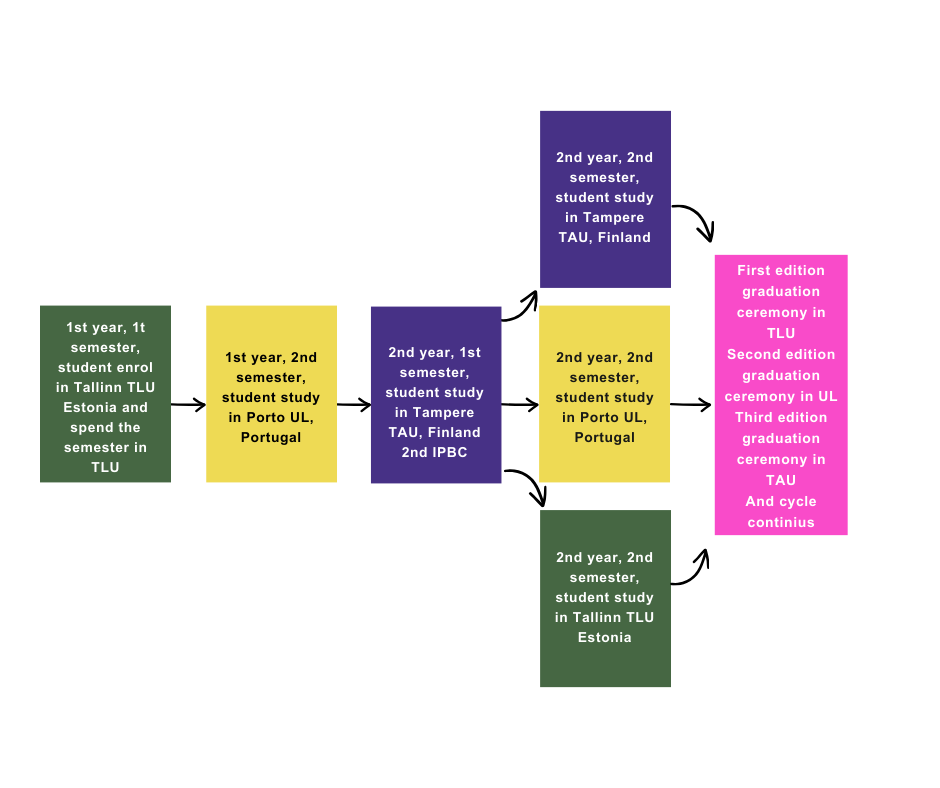The program is designed together with three universities: Tallinn University, School of Digital Technologies; Tampere University, Faculty of Information Technology and Communication Sciences; and Lusófona University, Faculty of Natural Sciences, Engineering. In addition, societal NGOs and industry partners such as Citizen OS, Estonian Anthropocene Center NGO, Lääne-Harju municipality, Inspirators!.
The Erasmus Mundus Joint Master’s Programme (EMJM) in Artificial Intelligence for Sustainable Societies focuses on sustainability, artificial intelligence and data-driven decisions, and participatory design methods engaging citizens. After completing the Master’s Programme, students understand and can use a participatory design approach for studying and designing AI and data-driven sustainable solutions for societies.
Interdisciplinary Project-based Learning
The program is taught in English and has a unique organisation of studies with novel hybrid pedagogies and interdisciplinary project course with real clients for integrating contacts between students, industry, companies, start-ups, and cities. The courses include technologies (e.g., virtual reality) for studying, field studies and designing solutions for real industry clients, NGOs, and cities.
Sustainability is a broad concept of equality, human and biodiversity, and the responsibility of us all to enhance environmentally sound solutions is the key to the projects and courses that combine societal, design and technology to solve real-life challenges provided by municipalities, cities, industry and NGOs.
Course Outline
The programme consists of the following academically dependent specialisations, which are studied in parallel in 3 different locations:
- Enrolling in Tallinn, basic studies in sustainable societies, AI and data and design.
- Continuing in Porto with a mix of electives and basic studies.
- Arriving at Tampere, studies are in the form of an Interdisciplinary Project-based course with real clients.
- Last semester focuses on professional placement and master’s thesis and allows students to choose a place from Tampere, Tallinn and Porto for their studies.

Who Are We Looking for?
Creative, visionary, reflective, and technologically interested students will shape the future of our cities, mobility, and well-being by caring for the earth. The programme welcomes students who master the English language, are open-minded, daring, and have a background or strong interest in one of the pillars. We welcome students with various backgrounds, including engineering, information technology, biology, geography, environmental sciences, design, social and humanistic studies, cognitive science, statistics, mathematics, and business and management.
Why Study with Us?
This is your chance to experience three excellent universities and three countries, their learning and research culture and become the best in Europe on Sustainable Society design using AI and data-driven approaches in a green way!
Study support facilities
The main facilities are the Labs libraries in the three universities; these include but are not limited to VR Lab (Tampere University), wearables (Tallinn University) including simple audio and video recording equipment to a full set of Wi-Fi and static Mirametrix eye-tracker, a set of Tobii eye-tracking glasses, Empatica wristbands, Muse headbands.
Further, studies also take place in the schools:
- Software Development Lab, featuring dedicated software development environments and tools
- Hardware and Robotics Lab, featuring a wide range of possibilities for physical prototyping, including a 3D printer
- Virtual Reality and Games Lab, featuring virtual reality and game development hardware and software
- Sports facilities
- Libraries
- Canteens and cafes
Career prospects
Energy efficiency: AI can improve energy efficiency in areas such as smart homes and the energy efficiency and sustainability of artificial intelligence and data management.
Environmental monitoring: AI-powered sensors and cameras can monitor and detect environmental threats such as deforestation, oil spills, and wildlife poaching, especially when combined with space data and citizen-provided data.
Waste reduction: AI can support waste reduction efforts through recycling and waste management processes optimisation and understanding and analysing the change from a societal perspective.
Sustainable transportation: AI can help reduce carbon emissions and support the development of sustainable transportation options, such as redesigning public transportation integrating with bicycling, walking, space planning and logistics. Again, the approach also includes designing and evaluating the human-centric aspect of the change from the point of view of accessibility, equality, diversity and habit change.
Ethics and responsibility: The use of AI in sustainability must be guided by ethical and responsible principles to ensure the technology is used for the greater good. This needs a historical and societal understanding of values, changes in values and how to avoid, e.g., hidden biases. Design that takes into account human, environmental and business aspects, responsible, service, interactions, environmental, transport design.
Societal sustainability: planning of places and places, service designs, societal processes, service accessibility, processes, places and spaces. In addition to media literacy, the ability to critically evaluate the mediating technologies and their impact on society.
Active citizenship: AI and Data-driven fair citizen services and activities, deliberative democracy negotiations, social media analysis and detecting fake news.
PhD positions: Excellent student can apply for the doctoral programs in related research fields within state or research project proposed PhD candidate openings.
